




















































































 
|
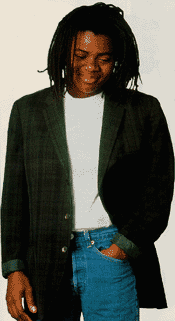 Tracy
Chapman Tracy
Chapman
The real heavy-hitters of the Lilith tour are
not the organizer, Sarah McLachlan, or the new stars like Jewel
and Paula Cole, but the actual veterans of the lesbian music
circuit, like the Indigo Girls, who are out of the closet on
their latest album, or Tracy Chapman, who is so shy that she
hardly says a word about herself in any direction, although
she's made no effort to hide her relationships with women.
Raised by a single mother, often in near-poverty, Chapman says
she understood "social conditions and political situations" from
an early age. When she was in sixth grade Chapman got her first
guitar and immediately began writing songs of her own. On
scholarship, Chapman attended the Wooster School, a private
boarding school in Connecticut, before enrolling in Tufts
University in Massachusetts. While at Tufts, Chapman
became a popular local street musician. After seeing her at a
South Africa protest rally, a classmate helped Chapman secure a
contract with an agent, who landed her an audition with Elektra
Records. Despite what Chapman herself thought was probably an
unmarketable style — direct, unadorned, and personal — her first
album was an astonishing commercial and critical success. Her
subsequent records Crossroads (1989), Matters of the Heart
(1992), and New Beginning (1995) have fared less well but have
confirmed her reputation as a perceptive, intelligent, and
complex songwriter.
Ever since she burst upon the musical world in 1988 with her
warm and magical debut album, Tracy Chapman has been one of our
finest contemporary songwriters and a performer of striking
originality, grace and charm. But she has also become much more
than that.
When you walk out of a record store with a new Tracy Chapman
album, you are not merely buying a collection of finely crafted
and elegantly executed songs. You are also somehow entering a
better world in which-for an hour’s worth of music at least-the
values of compassion, honesty and humanity are restored to their
rightful place in an otherwise increasingly giddy and trivial
global culture.
Born and raised by her mother in Cleveland, Ohio, she began
writing poetry and short stories at an early age. There wasn’t
much money in the family but her mother and sister saved to buy
Chapman her first guitar when she was eight. An academic
scholarship sent her to high school in Connecticut, where she
played at chapel services, and the school chaplain Reverend
Robert Tate organized a collection to buy her a new guitar. (He
was thanked years later in the credits on her first album.) At
Tufts University in Medford, Massachusetts, she studied
anthropology and honed her musical skills on the Boston folk
circuit, playing guitar and singing on the streets of Harvard
Square and performing at local coffeehouses and the campus folk
club.
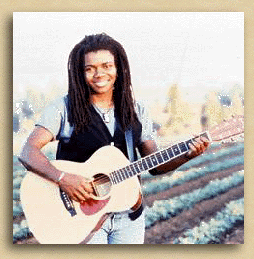 By
1987, she had signed to Elektra, a label with a proud
singer-songwriter history dating back to the 1960s heyday of the
genre. Her self-titled debut album, produced by David
Kershenbaum, was released in early 1988 and its warm, passionate
and heartfelt songs announced the arrival of a compelling
talent. At the time, the record was a breath of fresh air. By
the late 1980s, music was dominated by synths and drum machines
and the simplicity and sincerity of Chapman’s approach was
hugely refreshing. The songs themselves were full of sharp
observation, deeply rooted in her personal experience of growing
up poor in a working-class community in the inner city. By
1987, she had signed to Elektra, a label with a proud
singer-songwriter history dating back to the 1960s heyday of the
genre. Her self-titled debut album, produced by David
Kershenbaum, was released in early 1988 and its warm, passionate
and heartfelt songs announced the arrival of a compelling
talent. At the time, the record was a breath of fresh air. By
the late 1980s, music was dominated by synths and drum machines
and the simplicity and sincerity of Chapman’s approach was
hugely refreshing. The songs themselves were full of sharp
observation, deeply rooted in her personal experience of growing
up poor in a working-class community in the inner city.
The album met with immediate critical and commercial success,
but it was an appearance at the Nelson Mandela 70th-birthday
tribute concert at Wembley, London, in June that year that
introduced her to a mass global audience. “They didn’t have a
slot for me and I was kept waiting,” she recalls. “It was just
me and my acoustic guitar and I think they called me three times
hoping to put me on while the next act was getting ready.” On
each occasion it didn’t happen, and three times she was sent
back to the dressing room and told to wait again.
Then, just as Stevie Wonder was due to go on in a prime time
slot, he told dismayed organizers that his computerized programs
had gone missing and he could not appear without them. In a
panic, they called for Chapman. “I literally had to run to the
stage, dragging my guitar cable,” she recalls. “When I look back
at the footage I can see how unprepared I was. But I think it
also meant I had no time to feel the pressure.”
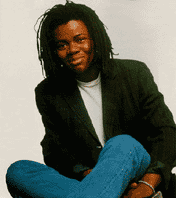 Her
spontaneous performances, seen by millions on television around
the world, was a sensation and the reaction was instant. She won
so many hearts that the following week the album soared to the
top of the charts in both Britain and the United States. Elektra
had believed in her from the outset and hoped the album might
sell 200,000 copies-a highly credible performance for a debut of
basically acoustic songs. Instead, it went on to sell more that
10 million copies and win three Grammy awards. Her
spontaneous performances, seen by millions on television around
the world, was a sensation and the reaction was instant. She won
so many hearts that the following week the album soared to the
top of the charts in both Britain and the United States. Elektra
had believed in her from the outset and hoped the album might
sell 200,000 copies-a highly credible performance for a debut of
basically acoustic songs. Instead, it went on to sell more that
10 million copies and win three Grammy awards.
But Tracy Chapman has never been an artist whose value can be
measured in statistics and chart placings. For her, the awards
and accolades have always been second to the integrity of her
songwriting and the emotional honesty of her voice. Drawing on
the songs she had written over the previous nine years, seldom
can there have been a more perfectly formed debut album.
The irresistible Fast Car gave her her first hit single, a
sharply observed tale of hope for a better life. It’s a powerful
and moving performance, the infectious melody and jaunty rhythm
juxtaposed dramatically with the seriousness ot its message
about the difficulties of breaking the cycle of deprivation.
Baby Can I Hold You is simply on of the
most beautiful love songs ever written, its perfect simplicity
matched by its overwhelming poignancy. Astonishingly, Chapman
was just 18 when she wrote the song. Talkin’ Bout A Revolution
is another early composition and its deliberate positioning as
the opening track of her first album announced her immediately
as a songwriter with a passionate commitment to the causes of
truth and justice, and who was not afraid to speak her mind.
“Poor people gonna rise up and get their share,” she sings with
such unswerving conviction that you believe implicitly in the
inevitability of those tables turning. She’s Got Her Ticket,
with its attractive reggae lilt, takes a similar theme to “Fast
Car,” but is full of bright optimism-a fervently expressed hope
that we all leave behind the “hatred, corruption and greed” and
find our own “place in the sun.”
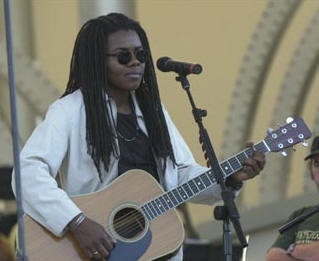 By
the time of Crossroads, her second album released in the fall of
1989, Chapman was a platinum-selling superstar. But she had also
earned huge respect as one of the most committed artists of her
generation. The songs on her debut had dealt with such issues as
violence against women, institutionalized racism and living on
welfare. She had played the six-week long Amnesty International
Human Rights Now tour with Bruce Springsteen, Peter Gabriel,
Youssou N’Dour and Sting, and also lent willing support to a
large number of other fund-raising benefits for good causes.
“I’m a musician and a songwriter rather than an activist,” she
says simply. “But I think it’s important if you are an artist to
use your music to stand up for what you believe in.” By
the time of Crossroads, her second album released in the fall of
1989, Chapman was a platinum-selling superstar. But she had also
earned huge respect as one of the most committed artists of her
generation. The songs on her debut had dealt with such issues as
violence against women, institutionalized racism and living on
welfare. She had played the six-week long Amnesty International
Human Rights Now tour with Bruce Springsteen, Peter Gabriel,
Youssou N’Dour and Sting, and also lent willing support to a
large number of other fund-raising benefits for good causes.
“I’m a musician and a songwriter rather than an activist,” she
says simply. “But I think it’s important if you are an artist to
use your music to stand up for what you believe in.”
Crossroads immediately went platinum, although ultimately its
sales did not match the success of her first album. Yet, in
retrospect, as a collection of songs it is another towering
achievement-rich in the depth of its emotion and acute in its
social observation. Her strongly developed social conscience is
evident in Subcity, in which she gives voice to the hopes and
fears of the underclass who are too often denied of their own.
The title track, Crossroads, is a more personal song that deals
with maintaining a sense of self. “All you folks think you run
my life, say I should be willing to compromise,” she rings a
voice that leaves no doubt she won’t be compromising her beliefs
for anyone.
The theme of the struggle to maintain integrity in a corrupt
world has become a central pillar in Chapman’s work and All That
You Have Is Your Soul, the third song included here from
Crossroads, similarly urges us to “hunger only for a taste of
justice.” The sentiments are offset by a simple but striking
arrangement, which also features Neil Young, whom she had
supported on tour.
It was almost three years before her next album, during which
time there were further appearances at concerts in London and
New York for Nelson Mandela (she had written “Freedom Now” on
Crossroads for him), Farm Aid benefits, and an appearance at a
Martin Luther King celebration. Matters Of The Heart, her third
album, appeared in May 1992. Helmed by Jimmy Iovine (a more
rock-oriented producer who had worked with Tom Petty, Simple
Minds and Patti Smith), it featured many of the musicians she
had met on the Amnesty tour.
As the title implied, Matters Of The Heart contained a greater
preponderance of personal songs and several tracks appeared to
deal with the loss of innocence. But it was another winning
collection, represented here by Bang Bang Bang, the album’s most
powerful song about the social hypocrisy regarding gun violence,
and the gentle Open Arms, which contains perhaps the record’s
most stricking melody. The latter includes soul legend Bobby
Womack on guitar, a collaboration that was a particular thrill
for Chapman. “I grew up listening to soul music and I was always
drawn to songs that had a social commentary-like the music of
Stevie Wonder, Harold Melvin & The Bluenotes, Marvin Gaye and
Bobby Womack,” she says.
After a sabbatical, her fourth album, New Beginning, was
released at the end of 1995. Co-produced by Chapman and Don
Gehman, it was to rival her debut in terms of commercial
success, selling within a year three million copies in America
alone. It was also her most mature collection of songs to date,
characterized by subtle arrangements that emphasized the
immediacy of the melodies and the depth of her lyrical emotion.
New Beginning took as its themes change, growth and renewal. It
was also a record imbued with healthy doses of idealism and
hope. “We’re at a place right now, approaching the new century,
where we could find new solutions to old problems,” Chapman
declared optimistically at the time of the album’s release.
Four tracks are included here. The Promise is a song of gentle
longing with a lovely string part counterpoised against her own
delicate acoustic guitar. I’m Ready has an almost mantra-like
quality that reflects the song’s spiritual themes of yearning
and redemption. Smoke and Ashes is more up-tempo, with one of
her most sensual vocals and a stirringly soulful chorus. But it
was the bluesy Give Me One Reason that was to prove the album’s
biggest hit single. She would later perform it at the 1997
Grammy awards with veteran bluesman Junior Wells on harmonica.
There was to be more than a four-year gap before her next album,
but Chapman was not idle. She joined the Lilith Fair tour,
played Tibetan Freedom Concerts, participated in a Bob Marley
tribute in Jamaica and even performed at the White House in a
benefit concert for the Special Olympics. Finally, her fifth
album, Telling Stories, followed early in 2000. It was more than
worth the wait. A subtle and lyrically complex collection of
songs that reached new heights of poetic expression, the album
found her reunited with producer David Kershenbaum for the first
time in more than a decade.
Most of the songs appeared to have a loose theme. “They touch on
different perceptions of reality-how we define, change,
manipulate and corrupt it,” she explained on the album’s
release. The driving title track, Telling Stories, has a
memorable melodyand deals with the complexities of truth and its
many different layers. The selections from the album included
here are completed by Speak The Word, an elegant ode to the
power of love, and the entrancing Wedding Song, with its
striking imagery and haunting vocal.
Of course, a single album is hardly sufficient to contain all of
the best songs of Tracy Chapman. Think of this rather as a
collection that seeks to represent the best qualities of her
songwriting-fearless insight, compelling social relevance, keen
intelligence, emotional resonance and lyrical compassion.
In these songs, you might say, all that we have is her soul. And
that is a very precious gift, indeed.
Tracy Chapman helped restore singer-songwriters to the spotlight
in the '80s. The multi-platinum success of Chapman's eponymous
1988 debut was unexpected, and it had lasting impact. Although
Chapman was working from the same confessional singer-songwriter
foundation that had been popularized in the '70s, her songs were
fresh and powerful, driven by simple melodies and affecting
lyrics. At the time of her first album, there were only a
handful of artists performing such a style successfully, and her
success ushered in a new era of singer-songwriters that lasted
well into the '90s. Furthermore, her album helped usher in the
era of political correctness -- along with 10, 000 Maniacs and
R.E.M., Chapman's liberal politics proved enormously influential
on American college campuses in the late '80s. Of course, such
implications meant that Chapman's subsequent recordings were
greeted with mixed reactions, but after several years out of the
spotlight, she managed to make a very successful comeback in
1996 with her fourth album, New Beginning, thanks to the Top Ten
single "Give Me One Reason."
Source: Article by Kate Tuttle
http://www.africana.com/Utilities/Content.html?&../cgi-bin/banner.pl?banner=Arts&../Articles/tt_123.htm
http://www.salon.com/july97/columnists/sexpert970718.html
http://www.txtriangle.com/archive/1001/entrolemodel.htm
http://www.womo.com/501/morris.htm
Published on Collection booklet © Nigel Williamson, Kent
England, July 2001
Nigel Williamson -- Kent, England July 2001
http://www.about-tracy-chapman.net/biography.htm****
Website:
http://www.about-tracy-chapman.net/index.htm
Home Site:
http://www.elektra.com/retro/chapman/
Other Links:
http://www.geocities.com/SunsetStrip/Palms/9541/
Article:
http://www.tracy-chapman.com/bio.htm
By: Stephen Thomas Erlewine
    
http://www.about-tracy-chapman.net/
Tracy Chapman's Website
|
|
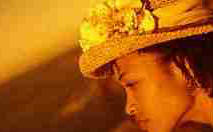
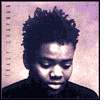
Tracy Chapman
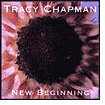
New Beginning
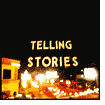
Telling Stories
Songs & Videos

Videos:
Telling Stories
Low Bandwidth

Bang, Bang, Bang
[Real
Player] [Launch*]

Give
Me One Reason
[Real
Player] [Launch*]
Other Songs
Wedding Song
Real Audio G-2 Clip
Give Me One Reason
real audio 3.0 ISDN Stereo
real audio 3.0 28.8 Mono
Less Than Strangers
real audio 3.0 ISDN Stereo
real audio 3.0 28.8 Mono
The Only One
real audio 3.0 ISDN Stereo
real audio 3.0 28.8 Mono
Telling Stories
real audio 3.0 ISDN Stereo
real audio 3.0 28.8 Mono
real video 56k
real video 28.8 (slideshow)
|
|

|